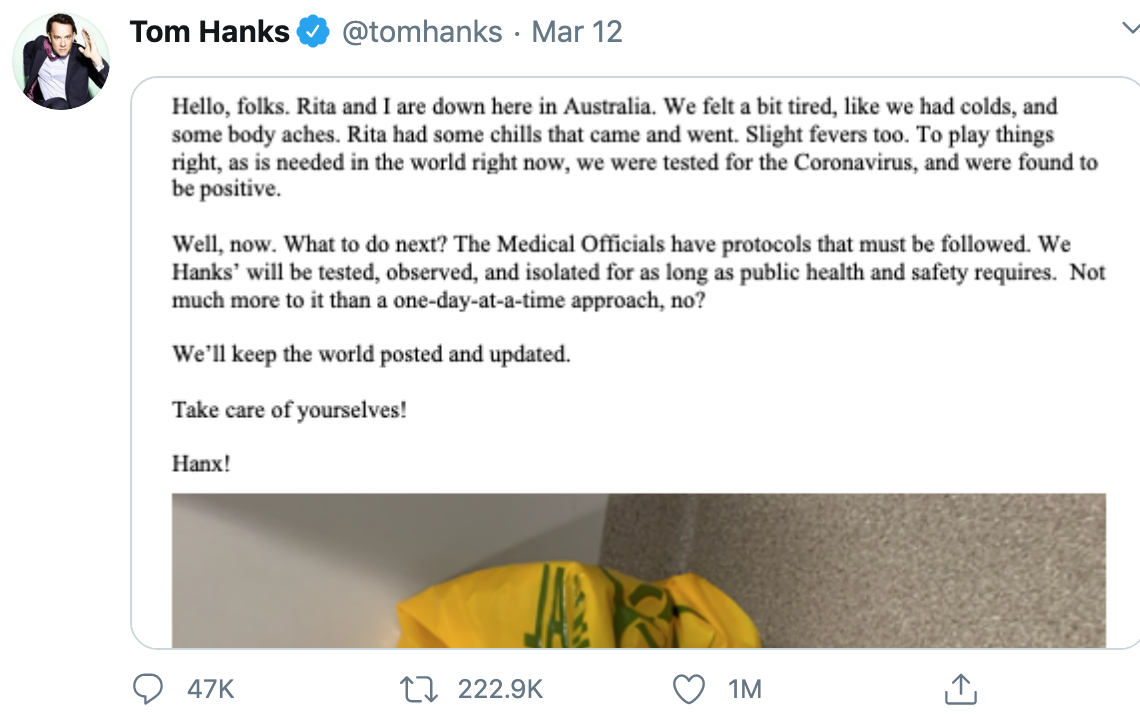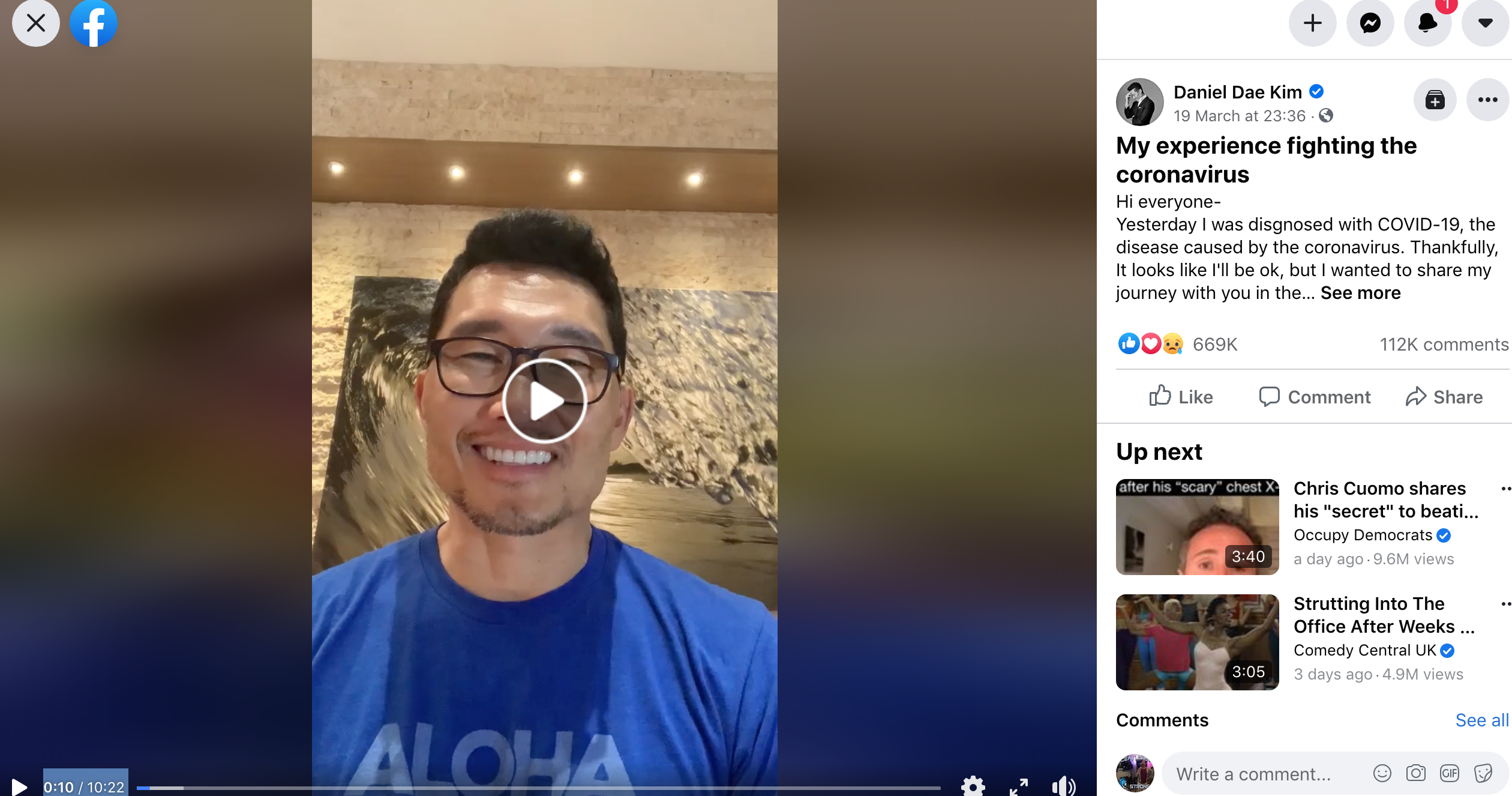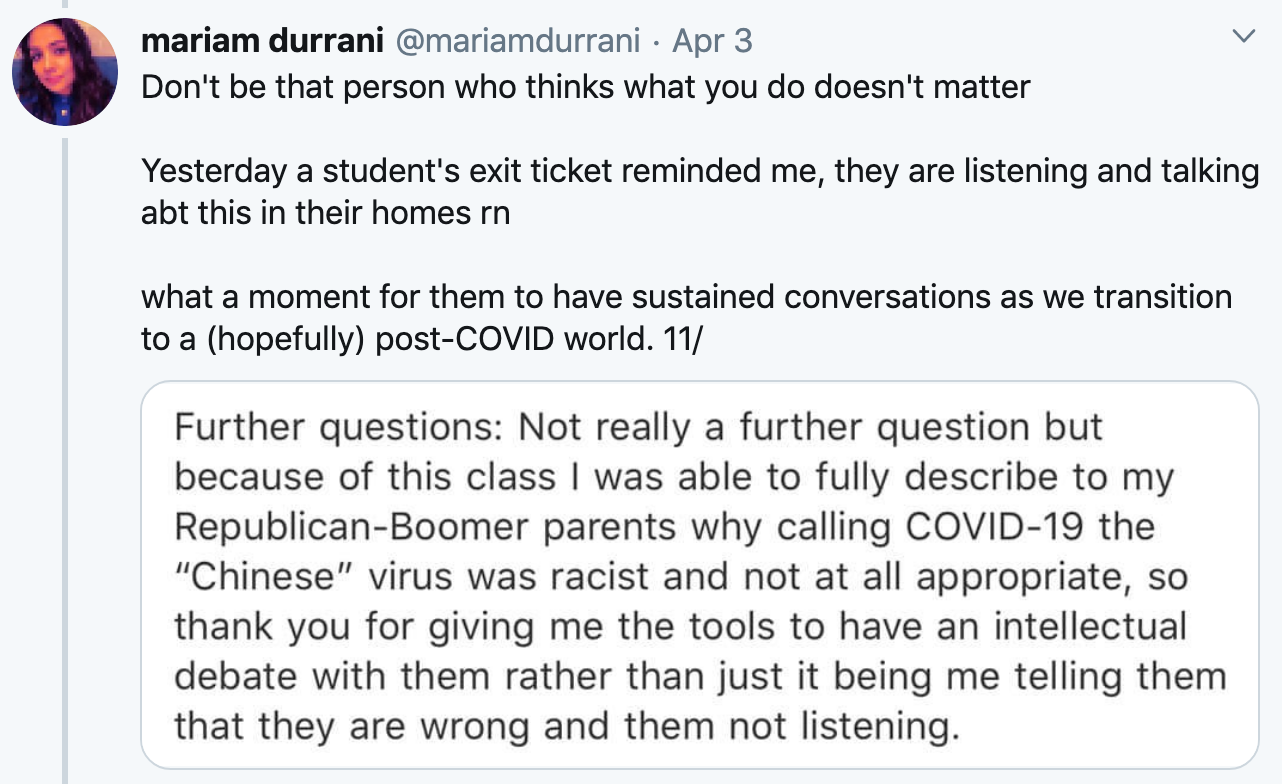Celebrities, the Coronavirus, and “Ordinary” People
Bridget Goodman
Nazarbayev University
Nur-Sultan, Kazakhstan
bridget.goodman@nu.edu.kz
My last two columns focused, needfully and mindfully, on serious dimensions and issues of the coronavirus crisis and teaching. Today, I turn to relatively light-hearted questions of the roles celebrities are playing in the age of corona.
My first thought goes to celebrities who have been diagnosed with Corona. On March 12, Tom Hanks announced via Twitter that he and his wife Rita Wilson had tested positive for coronavirus in Australia. In the Tweet below (Image 1), Tom Hanks reports on Twitter as follows:
Hello folks. Rita and I are down here in Australia. We felt a bit tired, like we had colds, and some body aches. Rita had some chills that came and went. Slight fevers too. To play things right, as is needed in the world right now, we were tested for the Coronavirus, and were found to be positive.
Well, now. What to do next? The Medical Officials have protocols that must be followed. We Hanks’ will be tested, observed, and isolated for as long as public health and safety requires. [NB: Tom Hanks wrote again they both returned home March 29.] Not much more to it than a one-day-at-a-time approach, no?
We’ll keep the world posted and updated. Take care of yourselves!
Hanx!

Image 1. Tom Hanks’ Tweet about testing positive. [Image description: Photo at the end of the post is of a trash can lined with a plastic bag containing biohazard markings and a pair of rubber gloves.] Source: https://twitter.com/tomhanks/status/1237909897020207104/photo/1.

Image 2. Daniel Dae Kim’s video and Facebook post “My experience fighting the coronavirus.” [Video description: Kim wears a blue t-shirt and glasses, looking straight into the camera] Source: https://www.facebook.com/136577846385452/videos/187723982681099/
It is worth noting that in his video, Kim commented that he did not ask for special treatment and stated he believes “healthcare for all is a right.” He also urged young people, in particular, to take this disease and the need for social distancing seriously. Kim closed with an appeal to stop the “prejudice and senseless violence against Asian people.” In other words, Kim used the positive result for coronavirus in the same way many actors use awards speeches—as an opportunity to use his celebrity status to advocate for social justice.
Other celebrities are using this time, through shifted forms of communication, to raise money for charity. Jimmy Fallon, who now performs the Tonight Show At Home, spoke via distance with Jennifer Garner about her work with Amy Adams. The two stars are helping raise money through Save the Children to provide lunches and books to children who now go without because they are quarantined at home. SiriusXM’s Seth Rudetsky and James Wesley have been hosting twice-daily Zoom meetings with different actors or casts of old TV series for “Stars in the House.” The show features stars in their homes, without makeup, and confronting the technical challenges many of us are experiencing running meetings or classes online. More importantly, each show aims to raise money for The Actors Fund, which offers financial support and other social resources to actors, who in the best of times, don’t always have steady work and now are shut down. Also, Peter Sagal, host of the National Public Radio weekly radio news quiz “Wait Wait Don’t Tell Me” (which is still on the air but recording at home without an audience), made an appeal in a Twitter thread for people to continue to donate to causes where he was to appear as a guest speaker at events now cancelled due to coronavirus:
This is, admittedly (don’t flame me!) among the least important concerns right now, but: many non-profits have had to cancel their spring fundraising dinner/galas. (I was supposed to attend one and host three others.) They are HUGE revenue generators for these groups.
Replying to @petersagal
IF you have the resources, and if you were planning on going to one of the parties or hoping to, donate the money anyway. You weren’t doing it for the open bar in the first place, right? Right?
Replying to @petersagal
I was scheduled to host galas for: @AWMuseum @thehousetheatre @Chicago_Run I’ll donate instead. If you’re like me, lucky enough to still be employed and not having to worry about survival, give to the non-profits you love. We’ll need them on the other side of this.
Later that same day, Sagal retweeted his own thread to expand the suggestion:
A number of people have responded positively to this, so: reply to this with a pitch for your fave non-profit that’s at risk, with a link to donate. Let’s see if we can help out a bit.
Last, I offer two examples of celebrities, both connected with the Star Trek series, who are using the time of quarantine to increase our connections with literature. Sir Patrick Stewart has taken upon himself the challenge of narrating one Shakespearean sonnet each day. There are enough sonnets for the next 5 months—hopefully not the actual length of our quarantine, but perhaps this is a tradition that can continue and accompany us when we are allowed to hit the beach again. Levar Burton, who hosted the Reading Rainbow TV show on PBS many years ago, has returned to read stories live on Twitter.
As you have probably guessed by now, I spend a fair amount of my time on Twitter and YouTube and Facebook, being entertained by celebrities or getting updates on their lives. In the age of corona, I find myself getting new glimpses’ into stars’ worlds—their homes, their pets and children, their faces with reading glasses. At the same time, I am seeing stars continue to use their “star power” to show gratitude for others, to look for ways to help others, and even to educate and elevate others.
As educators, we can follow their example and celebrate the ways we are already following this example. We can allow students to see glimpses of the human and family spaces of our lives, while recognizing there may be some gendered consequences. We can continue to show gratitude for helpers. We can continue to educate students and ourselves in ways that lead them to fight for social justice, as Penn students did recently for its food service employees. We can teach students to be aware of and resist systemic racism, as Dr. Mariam Durrani is doing with her linguistic anthropology students. She shows articles from social media, then uses concepts from linguistic anthropology and her previous research to break down step by step why certain discourses presented as facts are racist:
Jim Wilce’s breakdown of iconization in his textbook “Communication & Culture” into 5 steps helped students understand how this plays out
Step 1: a sociolinguistic fact is known so here we can start with the “fact” is that the virus 1st appeared in Wuhan, China; 6/
Step 2: this “fact” is interpreted by people as an index, or that there is a link between people who are Chinese and/or Asian/-appearing and the virus. An index functions like your index finger. It points something out. 7/
Talking abt the virus as a “Chinese thing” is an indexical process can lead to “virus”+”Chinese” being iconized in
step 3: This means that as people, esp in authority, talk abt it in this way, using that phrase, the indexical relationship is iconized for some ppl 8/
Step 4: As more and more people do this, they iconize the virus and *fear* of the virus onto the bodies of Chinese and Asian people. Some ppl violently attack the “Asian subject”, others talk abt it this way
Both are violent processes that differ by scale and impact 9/
In my research on the “Muslim subject”, a similar process happens where one can be Muslim or not; it’s irrelevant in the act of violence
The number of cases is climbing and although we can’t undo this racism, we CAN teach about it http://shorturl.at/ckGX2 10/
Dr. Durrani not only teaches about racism, she argues and offers evidence how teaching about it changes worldviews of her students and those around her. In a portion of a student exit-ticket, she Tweets:

Such a statement from a student suggests the time we are investing in teaching online and talking about corona may ultimately be worth it, and worth as much if not more than our customary learning outcomes and grades for this time period.

Author Bio:
Bridget Goodman is Assistant Professor and Director of the MA in Multilingual Education Program at Nazarbayev University Graduate School of Education, Nur-Sultan, Kazakhstan. Her teaching and research interests include: the use of the first language (L1) in second and foreign language classrooms, language policy, and sociolinguistics in post-Soviet countries.



 Academia.edu
Academia.edu